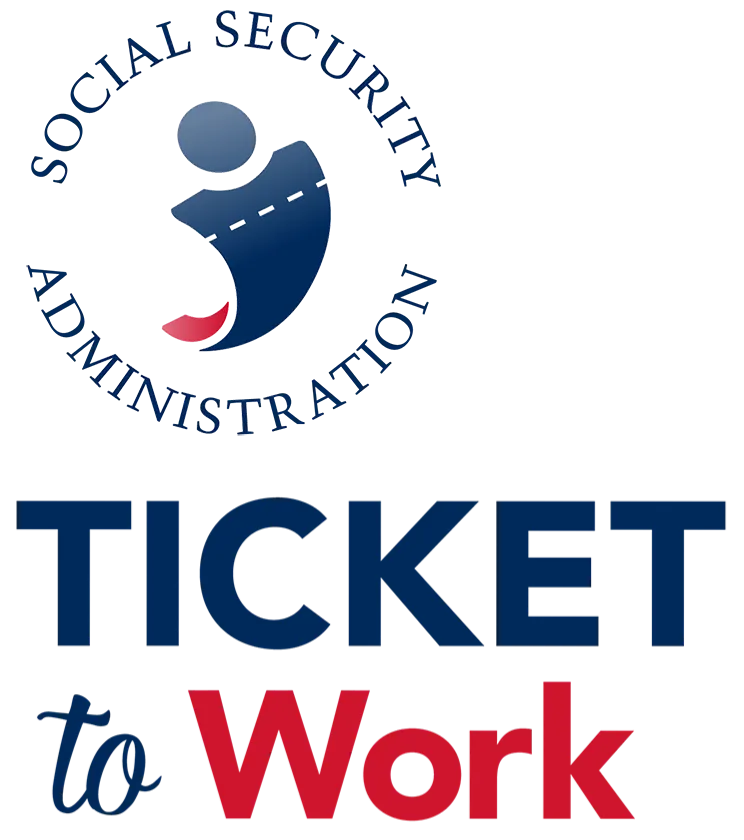Ticket to Work Program
Financial Independence Through Hard Work
Building Self Confidence and Self Sufficiency
Working hard and earning a paycheck is very satisfying and can lead to self-confidence and self-sufficiency. The Social Security Ticket to Work Program, or Ticket program, helps people with disabilities progress toward financial independence through hard work and training. The program is designed to offer vocational services to individuals that receive Social Security disability benefits.
Request Information
— This program is designed to offer vocational services to individuals that receive Social Security disability benefits.

What is the Ticket to Work Program?
The Ticket to Work Program provides most people receiving Social Security disability benefits with more choices for receiving employment services. SSI and SSDI beneficiaries may choose to assign their tickets to an Employment Network of their choice to obtain employment services, vocational rehabilitation services, or other support services necessary to achieve a vocational goal. The Employment Network will coordinate and provide appropriate services to help the beneficiary find and maintain employment.
What is Ticket to Work?
Ticket to Work is a free program through the Social Security Administration that encourages disability recipients to return to work. The Ticket Program expands the vocational services available to people on Social Security Disability Insurance (SSDI) and Supplemental Security Income (SSI) and provides additional protections to people’s disability benefits as incentives for them to attempt to return to work. This is not a mandatory program and is strictly voluntary. If someone chooses not to participate, their benefits will not be affected.
— The Ticket to Work program is designed to offer free vocational services to recipients of Social Security disability benefits.
Employment Networks
Employment Networks (ENs), which are generally made up of vocational services, nonprofits, and other entities, provide vocational training, job readiness, resumé writing, and other services to SSDI and SSI beneficiaries. Rather than ticket holders paying a fee for services, ENs are compensated by SSA for certain employment-related Milestones and Outcomes are achieved.
Each EN has its own way of achieving employment. When you choose ERI as your Employment Network, we will work with you to customize the services you need to achieve employment.
What is the goal of the Ticket to Work Program?
The purpose of the Ticket Program is to help SSI and SSDI recipients reduce their reliance on disability benefits and to promote increased self-sufficiency and independence.

Choosing Work Can Change Your Life
There are many benefits to working. ERI can assist you on your journey to achieve your career development and financial goals. The Ticket to Work program and Work Incentives allow individuals to receive training, support, and work experience while still receiving disability benefits. These programs allow you to keep your benefits while you explore employment, receive vocational support and gain work experience.
Career development is the process of choosing a career, gaining experience and knowledge, improving skills, and advancing in your journey. It’s a lifelong process, but it has to start somewhere and the Ticket to Work Program allows individuals with disabilities to get started down the road of independence.
Who is Eligible?
Most SSDI and SSI recipients are eligible for the program, but there are some stipulations and certain individuals might not qualify.
To qualify you must:
- Be between the ages of 18 through 64
- Receive Social Security Disability Insurance (SSDI) and/or Supplemental Security Income (SSI)
If you have questions about your eligibility, please contact us today!
While in the program, individuals might be able to use a combination of other work incentives in finding a job. Participating in the Ticket program does not make clients ineligible for other work incentives.
One of the most frequently asked questions is “Will I lose my Medicare eligibility if I participate in the program?” The answer is no. If you are involved in the Ticket Program, you will not lose your Medicare eligibility as long as you continue to receive SSDI benefit payments. There are also work incentives available that allow you to continue your medical coverage when you start to make enough money that you stop receiving SSDI payments.

While in the program, individuals might be able to use a combination of other work incentives in finding a job. Participating in the Ticket program does not make clients ineligible for other work incentives.
One of the most frequently asked questions is “Will I lose my Medicare eligibility if I participate in the program?” The answer is no. If you are involved in the Ticket Program, you will not lose your Medicare eligibility as long as you continue to receive SSDI benefit payments. There are also work incentives available that allow you to continue your medical coverage when you start to make enough money that you stop receiving SSDI payments.
Our Staff and Services
When you sign up with the Social Security Ticket to Work Program, you will be assigned to a career
counselor that you will continue to work with for the duration of the program. This allows
our clients and counselors to establish a relationship and better customize your plan.
Your career counselor will help identify the factors influencing your career development,
and help find the right career path for you.
The Bottom Line
The Ticket to Work program assists individuals receiving Social Security disability benefits to eventually decrease their dependence on disability benefits. The program promotes increased self-sufficiency and greater independence through work for people receiving Social Security disability benefits.
Remember, the Ticket program is free and voluntary.
You pay nothing.
Frequently Asked Questions
Do I have to pay to participate in the Ticket to Work Program?
Nope! The Ticket to Work Program is free and voluntary for anyone receiving SSDI. The Ticket Program provides you with vocational services and support at no cost to you. Social Security pays the Employment Network you choose as you achieve certain milestones and outcomes associated with work and earnings.
Can I participate in Ticket to Work and still get services from my State Vocational Rehabilitation (VR) agency?
Yes! State VR agencies provide a large variety of services to help people with disabilities return to work, enter new careers, or enter the workforce for the first time. You do not lose access to these services when entering the Ticket program.
What are Work Incentives?
Work Incentives are disability program rules that allow you to reduce your countable income so that you can continue to receive a cash benefit while you explore work or look for a job that is right for you. Examples of Work Incentives include the extension of Medicare and Medicaid coverage while working, impairment-related work expenses, and Plans for Achieving Self-Support.
Will I lose my Medicare and/or Medicaid if I get a job?
As long as you keep receiving a benefit check of any amount, you will keep your health insurance. If you earn enough that your SSDI checks stop, Medicare can continue for up to 93 months.
If you currently receive Medicaid, you should be eligible to continue receiving Medicaid even after you stop receiving Supplemental Security Income (SSI) benefits due to work. To be eligible you need to meet certain requirements, which include earnings below a threshold amount set by your state. Even if your earnings exceed the state threshold, you may still be eligible and should talk to your state Medicaid office.
If I enter the Ticket to Work program, will Social Security conduct a medical review of my case and take away my benefits?
Social Security does review your medical condition from time to time to see if you’re still disabled, using a process called the medical Continuing Disability Review, or medical CDR.
If you participate in the Ticket program with either an Employment Network or your State Vocational Rehabilitation Agency, and make “timely progress” following your individual work plan, Social Security will not conduct a review of your medical condition.
If a medical CDR has already been scheduled for you before you assigned your ticket, Social Security will continue with the medical CDR.
How do I put my Ticket into “Inactive Status?”
A beneficiary may have his or her Ticket placed into “Inactive Status” at any time by submitting a written request to Social Security. Inactive Status will begin on the first day of the month following the month your request is received.
Remember, once your Ticket is inactive, you will no longer be protected from medical Continuing Disability Reviews and Social Security can review your file during those months your Ticket is inactive if you are due for a medical Continuing Disability Review.
If I stop receiving SSDI checks due to my job, and I have to stop working because of my disability, will I have to reapply for benefits all over again?
Absolutely not. You will not need to reapply if your benefits ended within the past five years due to your earnings and you meet a few other requirements, including that you still have the original medical condition or one related to it that prevents you from working. This is a work incentive called Expedited Reinstatement.
You may even be able to receive up to six months of temporary cash benefits in addition to Medicare or Medicaid coverage while SSA conducts a medical review to determine if your benefits can be reinstated.
What is “Timely Progress?”
The Social Security Administration cannot perform a medical Continuing Disability Review while you are participating in the Ticket Program and progressing toward your employment goal. Every 12 months after you assign your Ticket to Work to an Employment Network, the SSA must decide if you are making the expected progress toward your vocational goal. The administration looks at progress such as completing certain education or getting and keeping a job. This is referred to as “Timely Progress Review.”
Can I use a Ticket to become self-employed or start my own business?
Certainly! If you’re interested in pursuing a self-employment goal, let your Employment Network know early in the process. Be aware, however, that ENs are not required to accept all Ticket assignments and they may not elect to work on a self-employment case.
What is the Student Earned Income Exclusion?
This provision allows a person who is under age 22 and regularly attending school to exclude earnings from income.
In 2022, the Student Earned Income Exclusion increased by 5.9% to $2,040 per month, but not more than $8,230 for the year.
Who is eligible for the Student Earned Income Exclusion?
Anyone who is under the age of 22 and a student regularly attending school, college, or training to prepare for a paying job.
What does “regularly attending school” mean?
Regular attendance means taking one or more courses of study and attending classes:
- 12 hours a week in grades 7-12.
- 8 hours a week in a college or university.
- In a course of training to prepare for a paying job for at least 15 hours a week if the course involves shop practice or 12 hours a week if it does not involve shop practice. This includes anti-poverty programs such as the Job Corps and government-supported courses in self-improvement.
- Home school education in accordance with the home school law of the state or other jurisdiction in which a person resides.
A person who is homebound because of a disability may be a student when he or she:
- Studies a course or courses given by a school (grades 7-12), college, university, or government agency; and
- Has a home visitor or tutor from school who directs the studying or training.
What is a Plan for Achieving Self-Support?
PASS is a Supplemental Security Income (551) work incentive that allows a person with a disability to set aside income and/or resources for a specific period of time to achieve a work goal. For example, a person may set aside income and/or resources for obtaining an education, job coaching, or other support services, transportation, job-related items or equipment to start a business.
Who qualifies for a PASS?
Anyone who receives 551 benefits or Social Security Disability Insurance (SSOI) and could qualify for SSI can have a PASS plan.
You must be under the age of 65, meet SSA’s satisfaction of disability or blindness, meet all 551 eligibility criteria with the exception of the income and resources test, and have earnings, unearned income, deemed income, in-kind support, or resources to set aside in the PASS.
Contact Us Today To Get Started
Our focus is your individual needs and helping you succeed.
At ERI, we believe in your power to make choices and supporting you reach your vocational goals.

